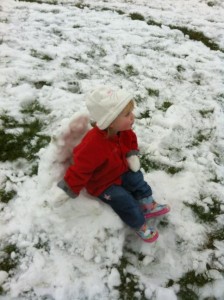I haven’t been making blog posts as often this year as I did last year. Partly because last year I had a baby who slept a lot, whereas this year I have a toddler with very firm beliefs about how often Mummy is allowed to sit at the computer before she gets to have a go too. Resulting in the very real possibility that anything I write will accidentally end up with ‘dfjgoehodnvlos!!!!’ in the middle of a sentence. Soon she will learn to type and I’ll probably have to implant a virtual iPad in her head or something, but for the moment, she’s mainly of use as an agent of chaos.
And partly because I’ve kept half-writing posts, then having a crisis of confidence about whether they’re too dull, controversial, niche, obvious, or all of the above. (All of the above would be quite a feat, admittedly.)
However, I have done a few things that you wouldn’t immediately be aware of from this page, so here they are:
- My eight-year-old has written some more stories for her bit of this site. I’m pleased I set this up for her, because it’s motivating her to finish stories rather than getting halfway through and then wandering off to kick trees. (Don’t ask.) I particularly like ‘Friday‘, which features grape-eating cutlery.
- I wrote some ebook reviews, and am in the middle of writing some more (but it’s taking a while – the good books are hard to write about and the bad ones are hard to read).
- I did a guest blogging stint for The F-Word and wrote three posts for them about musicals, porn genies and why I can, in fact, take a joke.
- I wrote a guest post for Choler speculating on whether David Cameron saw himself as a plucky maverick or as a Bond villain.
- I wrote a post on Sherlock Holmes and genderswitching for Bookshelf Bombshells, as part of their blog bonanza for the start of Sherlock series 2 in the US.
- I had my novel reviewed by The Future Fire!
- I created a Pinterest board of all the things you’d have had to own in the 1980s to equal one smartphone.
- I started using tumblr, which turns out to be fun, although I may be reaching my social media threshold soon.
- I created The Almost Art Project: photos of found-around-the-house art accidentally designed by my children.
I’m trying to write a second novel in theory, but – well, see my first paragraph: it’s hard to find the time. So while I wait for my children to get older and less needy*, I’m working on a couple more genderswitching projects – an illustrated ebook of genderswitched Grimms fairy tales, and an ebook anthology of genderswitched extracts from classics including James Eyre, June the Obscure and The Picture of Daria Grey. To be continued…
*Sometimes people take things I say very literally. I would like to clarify that I am not spending my time resenting my children and waiting for them to get older. Well, not all of my time. Sometimes I sleep.







